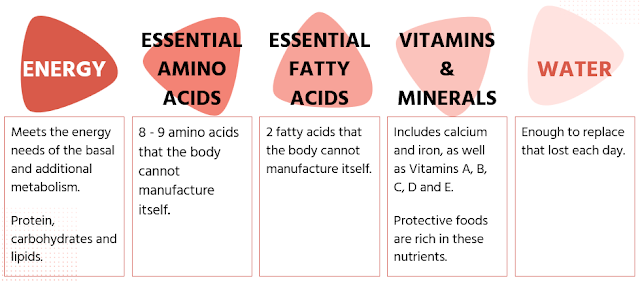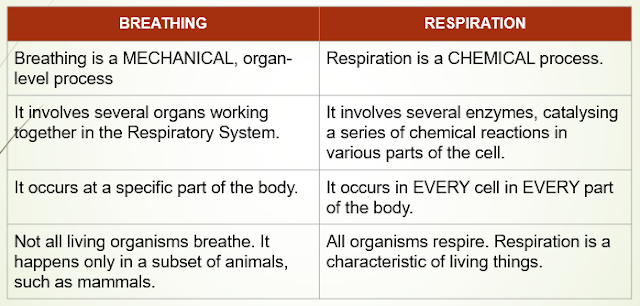BALANCED DIET AND MALNUTRITION [CSEC BIOLOGY AND HSB]
SYLLABUS REFERENCE
HSB
- [B1.10] discuss the importance of a balanced diet;
- [B1.11] discuss the effects of malnutrition on the human body;
[B2.11] discuss the importance of a balanced diet in humans;
- The results of deficiency or surplus
- The effects of age, sex, and occupation on dietary needs
- Vegetarianism
BALANCED DIET
YOUR 'DIET' IS THE QUANTITY AND QUALITY OF NUTRIENTS OBTAINED FROM THE FOOD YOU EAT ON A REGULAR BASIS.
A 'BALANCED DIET' IS A COMBINATION OF FOOD THAT PROVIDE ALL THE ENERGY & NUTRIENTS THAT A PERSON REQUIRES FOR THEIR IMMEDIATE NEEDS.
FOOD GROUPS
- Fruits
- Vegetables
- Grains
- Dairy
- Protein Foods
When Planning a Balanced Diet, Consider the Following:
- Any special needs, such as pregnancy or vegetarianism.
- Food variety
- Various foods have differing proportions of nutrients. Therefore, they have to be mixed in order to meet all the daily requirements.
- Meals should be regular, presented in an appealing way.
- The energy content of the foods.
- Note that, in the Caribbean, energy content is measured in kilojoules (kJ) NOT calories (Cal).
Vegetarianism
- Vegetarians do not eat meat. Their reasons range from religious to health.
- If foods are chosen carefully, you can get a balanced diet.
- Soya beans, nuts, milk, and margarine are very important to these diets.
Vegans
Vegan diets are completely plant-based. A healthy vegan diet includes:
- Five portions of a variety of fruit and vegetables every day.
- Meals based on potatoes, bread, rice, and cereals (ideally whole grain), pasta, or other starchy carbohydrates.
- Dairy alternatives, such as almond or soya drinks and yoghurt (low-fat, low-sugar).
- Some beans, pulses, and other proteins.
- Unsaturated oils and spreads, eaten in small amounts.
- Plenty of fluids (6-8 cups or glasses daily).
Several Factors Determine an Individual's Energy Requirements:
- Size of person (large persons require more energy)
- Sex/Gender (males tend to require more energy)
- Age (the elderly require the least energy)
- Occupation (active jobs such as construction require more energy than sedentary jobs such as office work)
- Climate (persons in cold climates require more energy to keep warm, as opposed to those in warm climates).
MALNUTRITION
MALNUTRITION DESCRIBES WHEN AN INDIVIDUAL'S DIET HAS INSUFFICIENT OR EXCESSIVE NUTRIENTS. ESPECIALLY THE MACRONUTRIENTS.
Protein-Energy Malnutrition (PEM)
P.E.M OCCURS MOSTLY IN CHILDREN RECEIVING INSUFFICIENT QUANTITIES OF PROTEIN AND/OR CARBOHYDRATES.
Marasmus - Due to Lack of Mainly Energy Foods
- Retarded growth and severe weight loss
- Dry skin & brittle hair
- If a child, the patient looks older.
- Patient has little to no energy or enthusiasm for anything.
- Treatment
- Initial treatment includes dried skim milk powder mixed with boiled water.
- Later, the mixture can also include a vegetable oil such as sesame, casein, and sugar.
- Once the patient starts to recover, continue with a balanced diet.
Kwashiorkor - Due to Lack of Mainly Protein Foods
- Occurs in older children that are fed mostly carbohydrates, especially after weaning from breastfeeding.
- Puffy, swollen appearance due to water retention. Bulging of the abdomen.
- Inability to grow or gain weight.
- Treatment
- Patient is fed with liquid protein supplements, with a gradual increase over time with several small meals .
- Balanced diet on recovery.
Anorexia & Bulimia - Due to Psychological Issues
- Anorexics eat too little, essentially starving themselves.
- Bulimics binge eat, then prevent nutrient absorption by inducing vomiting and taking laxatives.
- These disorders are more common in women than men, and often starts in the late teen years.
- Without psychological and medical intervention, it can be fatal.
Obesity - Usually Due to Excessive Nutrient Intake
- Causes
- Excess carbohydrate & fat (especially animal fat) in the diet
- Reduced or suppressed metabolic activity. Usually due to lowered thyroid hormones (hypothyroidism)
- Medical definition of obese:
- 20% above recommended weight for his/her weight
- Body-Mass Index (BMI) over 30.
- Associated health problems include increased risk for:
- High blood pressure (hypertension)
- Coronary heart disease
- Diabetes
- Arthritis
- Several cancers, including bowel & uterine.
- Treatment
- Put patient on a planned diet with reduced energy content, and rich in protective foods
- Get patient to develop a more active lifestyle, such as including regular exercise



